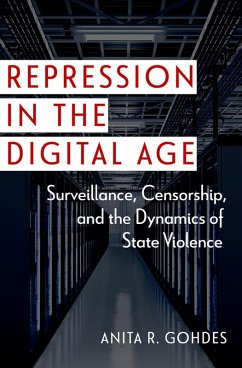Global adoption of the Internet has exploded, yet we are only beginning to understand the Internet's profound political consequences. Authoritarian states are digitally catching up with their democratic counterparts, and both are showing a growing interest in the use of cyber controls--online censorship and surveillance technologies--that allow governments to exercise control over the Internet. Under what conditions does a digitally connected society actually help states target their enemies? Why do repressive governments sometimes shut down the Internet when faced with uprisings? And how have cyber controls become a dependable tool in the weapons arsenal that states use in civil conflict? In Repression in the Digital Age, Anita R. Gohdes addresses these questions, and provides an original and in-depth look into the relationship between digital technologies and state violence. Drawing on large-scale analyses of fine-grained data on the Syrian conflict, qualitative case evidence from Iran, and the first global comparative analysis on Internet outages and state repression, Gohdes makes the case that digital infrastructure supports security forces in their use of violent state repression. More specifically, she argues that mass access to the Internet presents governments who fear for their political survival with a set of response options. When faced with a political threat, they can either temporarily restrict or block online public access or they can expand mass access to online information and monitor it to their own advantage. Surveillance allows security forces to target opponents of the state more selectively, while extreme forms of censorship or shutdowns of the Internet occur in conjunction with larger and more indiscriminate repression. As digital communication has become a bedrock of modern opposition and protest movements, Repression in the Digital Age breaks new ground in examining state repression in the information age.
Dieser Download kann aus rechtlichen Gründen nur mit Rechnungsadresse in A, B, BG, CY, CZ, D, DK, EW, E, FIN, F, GR, HR, H, IRL, I, LT, L, LR, M, NL, PL, P, R, S, SLO, SK ausgeliefert werden.









